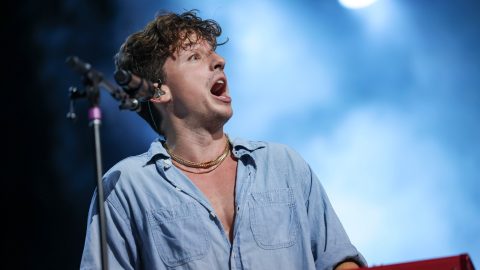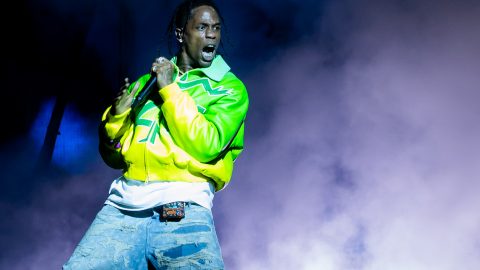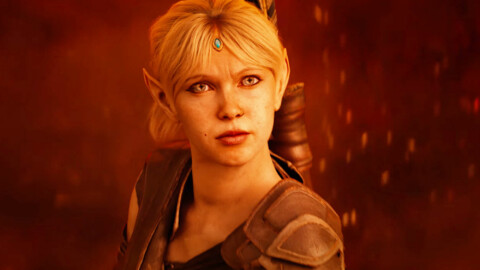
There were very few, if any, empty seats at the glorious Gocheok Sky Dome in Seoul, South Korea. The throngs of fans, eagerly awaiting to see the showdown between China’s Weibo Gaming and South Korea’s T1 at the League of Legends Worlds 2023 Finals, filled the stadium with an energy that was immensely palpable. We were ready for the esports event of the year, but Riot Games knew how to turn up the hype even more.
- READ MORE: The 25 best K-pop songs of 2023
Star-studded performances kicked off the Worlds 2023 Finals opening ceremony on a high – being able to watch it live was definitely a core memory moment. Heartsteel were up first with their debut single, ‘Paranoia’. Featuring League of Legends characters Ezreal, Kayn, K’Sante, Sett, Yone and Aphelios – with the first four having real-life counterpart musicians that provide their vocal talents: EXO‘s Baekhyun, Cal Scruby, Tobi Lou and OZI, respectively. The clever mix of augmented reality and computer graphics with real life performances heightened the experience in a way that allowed Riot Games to put on a truly unique show that showcased the League of Legends IP.
Maria Egan, head of music and live events at Riot Games, tells NME that the “Baekhyun and Ezreal collaboration was a dream from the beginning”. When it comes to matching up the artists to the Heartsteel members, it’s usually a trial and error process that takes months. “You want to make sure that the artist is super invested,” she said. “We ended up in a place where they all feel very connected to the champions that they ended up performing.”
All four musicians appeared on the main stage to perform their parts, but what happened during the final chorus of ‘Paranoia’ was the biggest surprise. While you couldn’t tell just by watching the main stage, on the screens to the left and right, you could see the virtual counterparts of Heartsteel pull up in a car and join their real-life ones on stage together. The transition was incredibly smooth and, expectedly, the crowd erupted.
Virtual avatars have been around for over two decades, but have started to become increasingly popular – especially in the world of K-pop, with the likes of aespa, MAVE:, Superkind and more. Egan emphasises that many successful virtual bands don’t appear out of nowhere, and uses Gorillaz as an example. Musician Damon Albarn and comic artist Jamie Hewlett were already at the peak of their careers. Albarn was the frontman for the influential rock band Blur while Hewlett worked on comics such as Judge Dread and Doom Patrol. Together with their talents, the two created the idea for Gorillaz.
Egan also mentions the Japanese vocaloid, Hatsune Miku. She is one of the few virtual avatars that was able to gain massive popularity without an existing fanbase. Hatsune Miku was originally just a voice synthesiser where people would enter the melody and lyrics of a song, then be able to sing in a synthetic voice. However, Hatsune Miku’s personification and character design as a cute girl with blue hair on the outside of a box made Yamaha Corporation’s Vocaloid 2 product stand out amongst its competition of other vocaloid software.
Since then, Hatsune Miku has been treated like an actual artist rather than just a mascot of a piece of computer software. This is all thanks to fan and community support, where fans created original music and Hatsune Miku covers of popular ones. “So Gorillaz has had its own story, and then Hatsune Miku’s is really about the community and about co-creation,” Egan explains. “So that’s a very different thing where the community is at the center of it, and not necessarily an artist.”

League of Legends‘s success with its virtual music groups is a mix of both Gorillaz and Hatsune Miku’s approaches. The community is already passionate about the champions in League Of Legends – they’ve become invested after years of gameplay, learning all about their backgrounds, lore, play styles and more – and seeing Riot reinvent them is just the cherry on top. The fans’ adoration for these characters extend into other ventures that they are placed in, including music.
“For us, it’s this beloved, massive IP at the centre of it. And that’s really what the core of all of our projects are like, telling stories of Runeterra and telling the stories of the League IP in a new context in a new world that’s more accessible in pop culture,” Egan adds. She also notes how difficult it is to even make one song. While technology has made the motion capture process easier, it’s not enough to just drop one piece of cool animation and call it a day. There needs to be a fanbase or audience that really loves what you do.
The moment that a new virtual band is revealed needs to feel special, and to do so took many departments at Riot Games banding together just to create ‘Paranoia’. “Just making Heartsteel takes almost a year, with a lot of people touching it like composers, songwriters and producers crafting and getting the sound right,” Egan says. “There are many different versions of that song on the cutting room floor.”
Heartsteel is a good example of surprising fans with new experiences that keep them engaged and coming back for more League of Legends content. “Nobody saw that coming. Our goals are just to continually elevate and raise the bar of what we’ve built on before,” she says. Now that Heartsteel joins the ranks of K/DA, Pentakill and True Damage, fans are wondering if some of the other groups are due for a comeback soon.
“Stay tuned on that front,” Egan says In response to whether K/DA would return. “Everyday, we’re figuring out how we meet players’ expectations and also blow them away.”
League of Legends is available to play on PC and Mac.
The post Riot Games on Heartsteel: “The Baekhyun and Ezreal collaboration was a dream” appeared first on NME.







